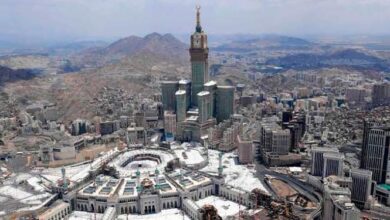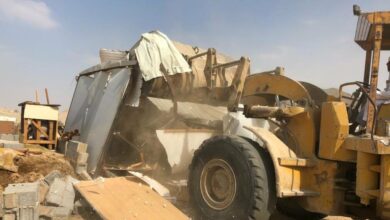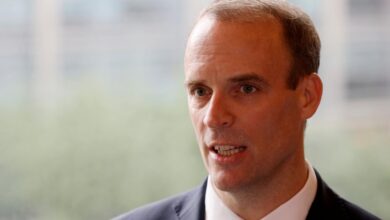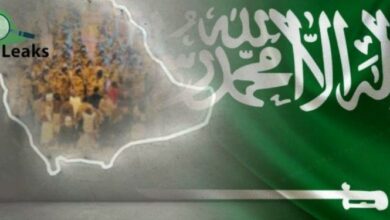Anger in Saudi Arabia over a massive demolition campaign in Jeddah

A massive demolition campaign targeting neighbourhoods in Jeddah and displacing its residents was met with huge public anger in Saudi Arabia, amid accusations of the authorities giving investment and earning money at the expense of the rights of poor citizens.
The Saudi authorities are targeting 46 Jeddah neighbourhoods, which are being removed, threatening to displace 1.5 million citizens, at a time when the government has not developed alternative plans for housing the homeless citizens or a clear compensation system for the affected.
Tweeters circulated video clips confirming the absurdity, lack of planning and mismanagement in the projects of Crown Prince Muhammad bin Salman under the guise of removing slums, which is nothing but an excuse to empty the pockets of citizens and waste the country’s resources in the name of investment and fake projects and the demolition of some historical sites and making people poorer.
The tweeters highlight that in all countries, there are old neighbourhoods that need treatment by renovation, restoration or even demolition, but what is happening in the Kingdom: the demonization of the people of the targeted neighbourhoods and the lack of real compensation, while the compensation (if any) is after the demolition of houses, while the demolition mechanisms and the short period of eviction make you feel that The government deals with enemies, not citizens.
Activists on social media have condemned the practices of the Saudi authorities in demolishing and removing entire residential neighbourhoods in Jeddah, denouncing the displacement of residents and not giving them a deadline to find alternatives to housing instead of their completely demolished homes.
The demolition of Jeddah’s neighbourhoods comes at a time when Mohammed bin Salman launched a new investment project to build four major global landmarks: “an opera house, a museum, a sports stadium, ocean basins and coral farms,” in addition to 10 quality entertainment and tourism projects, in The framework for implementing the projects of Vision 2030.
Social media activists, who tweeted under the hashtags #DestroyJeddah, and #ThreateningJeddah, said that “a humanitarian, social and economic catastrophe will affect at least one million people.”
The Jeddah Municipality gave the residents 48 hours, some only 24 hours, and some ordered them to evacuate immediately to demolish their houses. The activists added that “the Jeddah Municipality cuts off water, electricity and services before issuing the warning,” stressing that the compensation provided to some is not equal to one-third of the value of the homes they own.
The city of Jeddah is located on the coast of the Red Sea in the middle of the coast from the east. It is considered the economic and tourist capital of the Kingdom. The neighbourhoods threatened with demolition are considered part of this Hijazi city’s social and urban history, which is a centre for trade and the gateway to Mecca.
A member of the Saudi opposition National Gathering Party, Omar Abdel Aziz, commented on the demolition work in Jeddah, saying, “Those affected by the development and removal of buildings and homes are retirees, former soldiers, and small earners.”
Abdel Aziz added in a panel discussion entitled It’s Your Turn to the Voice of People program on Twitter that the development did not take into account finding alternatives for these population groups, except for the increase in new rents if these displaced persons moved to those homes and apartments, which would cost them additional amounts of their limited incomes.
The Secretary-General of the opposition Saudi National Gathering Party, Abdullah Al-Awda, said that what is happening in the Jeddah development project represents a forced displacement of the affected people, pointing out that “the fate does not determine their displacement, the value of compensation, or the new place to which they will take refuge, in addition to robbing them.” their right to refuse or appeal.
Tweeter Hanan Al-Otaibi wrote on her page that “the Saudi authority is behaving with the people like bandits. Houses are demolished, and lands are seized, demolishing and removing the homes of citizens in Jeddah.”
Activist and human rights activist Alia Abu Tayeh Al-Hwaiti recalled the forced displacement of the Al-Huwaitat tribe to establish the NEOM project, referring to the killing of citizen Abdul Rahim Al-Hwaiti for denouncing the practices of the Saudi authorities.
The Saudi activist, Nasser Al-Arabi, lamented the displacement of the local residents by the Saudi authorities from the neighbourhoods of Al-Ruwais, Al-Baghdadiah, Al-Hindawiya, Ghalil, Al-Karantinah and others, for allegedly implementing development projects developing”.
It is noteworthy that human rights sources reported to Saudi websites that the demolitions displaced 7,196 people from the Dhahban neighbourhood, 10,906 from the Thuwal neighbourhood, 7973 from the Al-Nuzha neighbourhood, 9388 from the Mushrifa neighbourhood, 121,590 from the Jama’a neighbourhood, 44,385 from the Al-Hindawiyah neighbourhood, and the Al-Tha’alibah neighbourhood, which the Saudi authorities started to demolish. On the 30th of last December.
The sources indicated that other small areas would be demolished, including Al-Faw, Al-Mahamid, Al-Thaghr, Dhahban, Mashrafa, Bani Malik Al-Qurayyat, and Al-Sharafiya.





